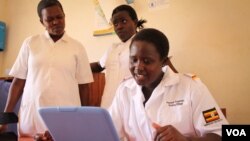KARAMOJA, UGANDA —
A new telemedicine facility in one of the most remote regions of Uganda allows local health care workers to consult online with doctors in Kampala. The potential for Uganda’s poorly-staffed health centers could be huge.
At Nadunget Health Center in Karamoja, northeastern Uganda, dozens of patients wait stoically for their turn to see a nurse. Rosemary Napeyok, head of the facility, leads a team of nurses and midwives who serve about 25,000 people in the area. Most illnesses, she explains, are fairly straightforward.
“The major conditions we treat here are malaria, respiratory tract infections and gastrointestinal infections. We also get a few cases of viral infections, like right now there is an outbreak of hepatitis,” she said.
But not all cases are so simple, and like all health centers in Karamoja, Nadunget has no doctor. Advanced stages of AIDS, severe malaria and more obscure diseases often baffle the nurses. Standard procedure is to send such patients to the referral hospital in the town of Moroto, 10 kilometers away.
But, Napeyou says, the roads are terrible, transport is often lacking and even the referral hospital has only two doctors.
“Even sometimes phone calls become a challenge. The whole weekend there was no network. So if you have no transport here there is no way you can reach the next person who can help you to have the patient referred to the referral hospital,” she said.
But thanks to a brand-new satellite Internet connection, consulting a doctor has just become much easier.
A simple call over Skype, a free software, is often enough to clear up any doubts in the nurses’ minds.
Godfrey Bampiiga works for UNICEF, which set up the connection to pilot the concept of telemedicine. He explains that the computers the health center uses run on solar power, important in a region almost completely off the electric grid.
“These are small but robust computers, very nice, cost effective. You just have to turn it to face where the patient is, you adjust, and the doctor is able to see exactly how the patient is doing,” he said.
UNICEF’s Rebecca Kwagala adds that Skype conference calls can make a big difference as well.
“If you call for a meeting and they have to close the health facility, then there will be no one to give services to the community. With this it can also be used for meetings and also trainings. People don’t have to move,” she said.
On the other end of the line are doctors like John Mark Bwanika, director of a Kampala call center staffed 24 hours by doctors and pharmacists. Although Nadunget is the only public health center using the Skype system so far, Bwanika says he sees a lot of potential for expansion in the north, east and far west of the country.
“These are regions that are probably farthest from the possible training centers. It would mean that the staff there would have to travel long distances to attain any form of training. The doctor and pharmacist coverage in those areas is also the most wanting in Uganda - regions of the country which are at the bottom of the pyramid in terms of health services,” said Bwanika.
Over time, speaking regularly to a doctor actually builds up the knowledge and capacity of the nurses themselves, says Bwanika.
“What we’ve seen is that once they learn things like that from a doctor or a qualified pharmacist, these are skills or knowledge that they will actually carry on, and next time they probably won’t need to consult on that and they will just do the right thing,” he said.
Uganda’s health care system is not growing as fast as its population, he adds. The future health of Ugandans, says Bwanika, may depend on modern technology to fill in the gaps.
At Nadunget Health Center in Karamoja, northeastern Uganda, dozens of patients wait stoically for their turn to see a nurse. Rosemary Napeyok, head of the facility, leads a team of nurses and midwives who serve about 25,000 people in the area. Most illnesses, she explains, are fairly straightforward.
“The major conditions we treat here are malaria, respiratory tract infections and gastrointestinal infections. We also get a few cases of viral infections, like right now there is an outbreak of hepatitis,” she said.
But not all cases are so simple, and like all health centers in Karamoja, Nadunget has no doctor. Advanced stages of AIDS, severe malaria and more obscure diseases often baffle the nurses. Standard procedure is to send such patients to the referral hospital in the town of Moroto, 10 kilometers away.
But, Napeyou says, the roads are terrible, transport is often lacking and even the referral hospital has only two doctors.
“Even sometimes phone calls become a challenge. The whole weekend there was no network. So if you have no transport here there is no way you can reach the next person who can help you to have the patient referred to the referral hospital,” she said.
But thanks to a brand-new satellite Internet connection, consulting a doctor has just become much easier.
A simple call over Skype, a free software, is often enough to clear up any doubts in the nurses’ minds.
Godfrey Bampiiga works for UNICEF, which set up the connection to pilot the concept of telemedicine. He explains that the computers the health center uses run on solar power, important in a region almost completely off the electric grid.
“These are small but robust computers, very nice, cost effective. You just have to turn it to face where the patient is, you adjust, and the doctor is able to see exactly how the patient is doing,” he said.
UNICEF’s Rebecca Kwagala adds that Skype conference calls can make a big difference as well.
“If you call for a meeting and they have to close the health facility, then there will be no one to give services to the community. With this it can also be used for meetings and also trainings. People don’t have to move,” she said.
On the other end of the line are doctors like John Mark Bwanika, director of a Kampala call center staffed 24 hours by doctors and pharmacists. Although Nadunget is the only public health center using the Skype system so far, Bwanika says he sees a lot of potential for expansion in the north, east and far west of the country.
“These are regions that are probably farthest from the possible training centers. It would mean that the staff there would have to travel long distances to attain any form of training. The doctor and pharmacist coverage in those areas is also the most wanting in Uganda - regions of the country which are at the bottom of the pyramid in terms of health services,” said Bwanika.
Over time, speaking regularly to a doctor actually builds up the knowledge and capacity of the nurses themselves, says Bwanika.
“What we’ve seen is that once they learn things like that from a doctor or a qualified pharmacist, these are skills or knowledge that they will actually carry on, and next time they probably won’t need to consult on that and they will just do the right thing,” he said.
Uganda’s health care system is not growing as fast as its population, he adds. The future health of Ugandans, says Bwanika, may depend on modern technology to fill in the gaps.





